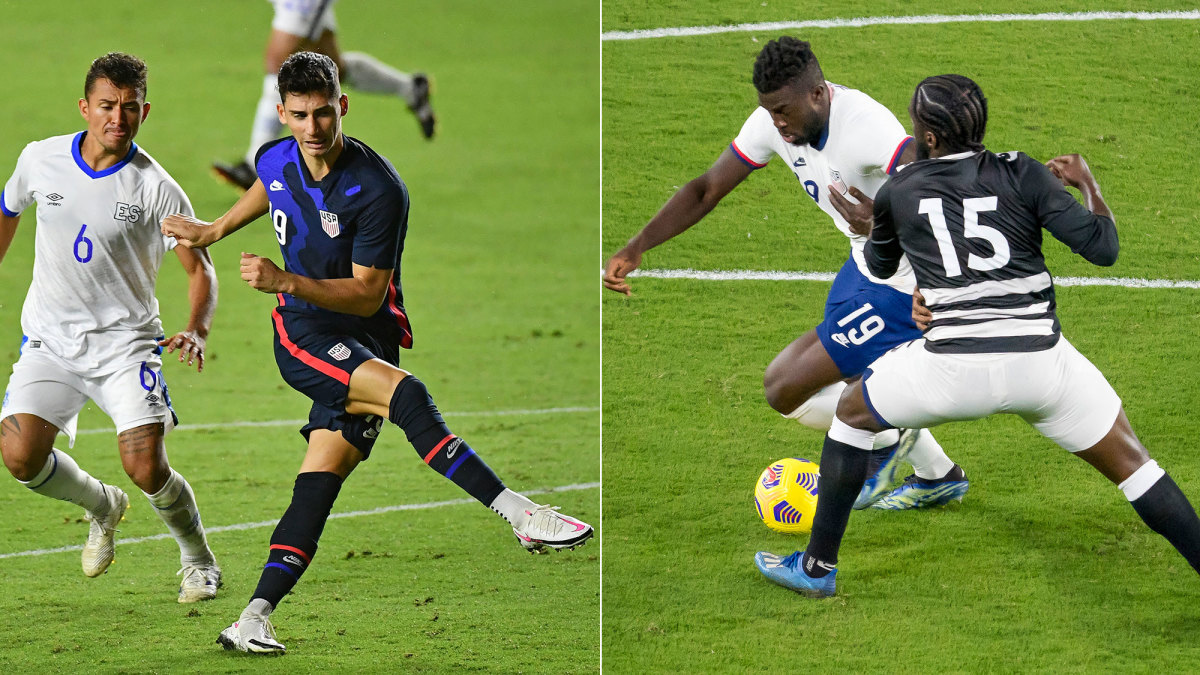Meaningless Friendlies? Not for a Pair of USMNT Forwards
The notion that the U.S. men's national team's two recent off-FIFA-calendar friendlies against patchwork and overmatched opponents could carry some sort immediate significance seems like a bit of a stretch on the surface.
Just don't tell that to Sebastian Soto or Daryl Dike.
The two 20-year-old U.S. forwards will be spending the coming months with clubs in England's second tier, with Soto able to suit up for parent club Norwich after spending the first half of the season on loan in the Netherlands, while Dike has parlayed his rookie breakout with Orlando City into a deadline day loan to Barnsley. Without their respective appearances vs. El Salvador and Trinidad & Tobago—6–0 and 7–0 victories with little competitive consequences—neither would be possible.
Lost in the weeds of transfers and loans to clubs in England and Wales is the U.K. work permit hurdle. Barring the possession of a requisite passport, players can't feature for clubs in those nations without one. That's nothing new, of course, though the rules and parameters surrounding them have changed, and Brexit has made it an issue not as unique to U.S. players as in the past. With the lack of free movement between European nationals to the U.K., all outsiders are now subject to a new point system that takes into account multiple factors.
National team FIFA ranking, the percentage of games played for the national team over a given time period (one year if you're a U-21 player, two if older), what league you play in and how much you've played for your club are all parts of a detailed equation. (The English FA spells it all out here.)
It takes 15 of the work permit points for automatic approval, and based on the U.S.'s FIFA ranking, the starting point for a player who has hit just below the percentage of games played requirement for the senior national team for automatic approval (in the USA's case that's 60%), is 10 points. That number of points accrued decreases if the percentage of games is a lower figure.
To that end, the pandemic has oddly played into some U.S. players' favor. With fewer games than usual over the course of the last year, it's been easier to play in a higher percentage of them. In the U.S.'s case, the senior team has had five friendlies between Jan. 31, 2020, and Jan. 31, 2021 (vs. Costa Rica, Wales, Panama, El Salvador and Trinidad & Tobago).

Soto made his U.S. debut vs. Panama in November, scoring two goals off the bench, and then was called in for the December friendly vs. El Salvador—a game for which he was available only because he was serving a red card suspension at his club, Telstar (a club he was only at due to his inability to secure a work permit over the summer). By virtue of his 40% attendance rate and the U.S.'s ranking, that gave him a nine-point base. Dike made his U.S. debut Sunday night, playing for the last 25 minutes in his parent club's stadium in Orlando. With a 20% appearance figure, he started with seven points. Those figures, combined with the necessary requirements hit on the club level, wound up putting them over the top for permit approval.
(Unlike Soto and Dike, 25-year-old Paul Arriola, who secured a loan to Swansea City, was subjected to a two-year time window with the national team due to his age. He appeared in 15 of 18 national team games in 2019 and then three of the last five since, far exceeding the percentage requirement and giving him a clear pathway to a work permit.)
Are USMNT GM Brian McBride, coach Gregg Berhalter and their staff detail-oriented enough to plan this out? It's certainly possible that they're aware of the circumstances surrounding their players, though it's a stretch to definitively draw a direct connection.
For instance, if the ability to help a player out is on the table over the course of his organic involvement in camp, then that's one thing, but they're not necessarily going to put players on the field just as a means to an end for them on the club level. That's not the point of a national team, for which appearances are still sacred territory and earned through performance. In the same way that Berhalter has repeatedly indicated he wouldn't shoehorn a dual-national player onto the field just to cap-tie him despite the opportunity potentially arising, there are other factors to consider.
Dike, for example, just worked through a two-week camp with the U-23s before earning a place with the senior side for the final week leading into the Trinidad game. His loan to Barnsley, by all accounts, materialized rather quickly, with no rumor-mill fanfare. This was not some diabolical plot carried out from start to finish. That said, if there's a secondary benefit for a deserving player to see the field, then it's an added bonus.
The bonus, in the most recent cases, benefited two U.S. forwards, and it's a reason why they will be featuring in England ahead of a busy stretch of more meaningful games–for competitive reasons–for the national team this year.
